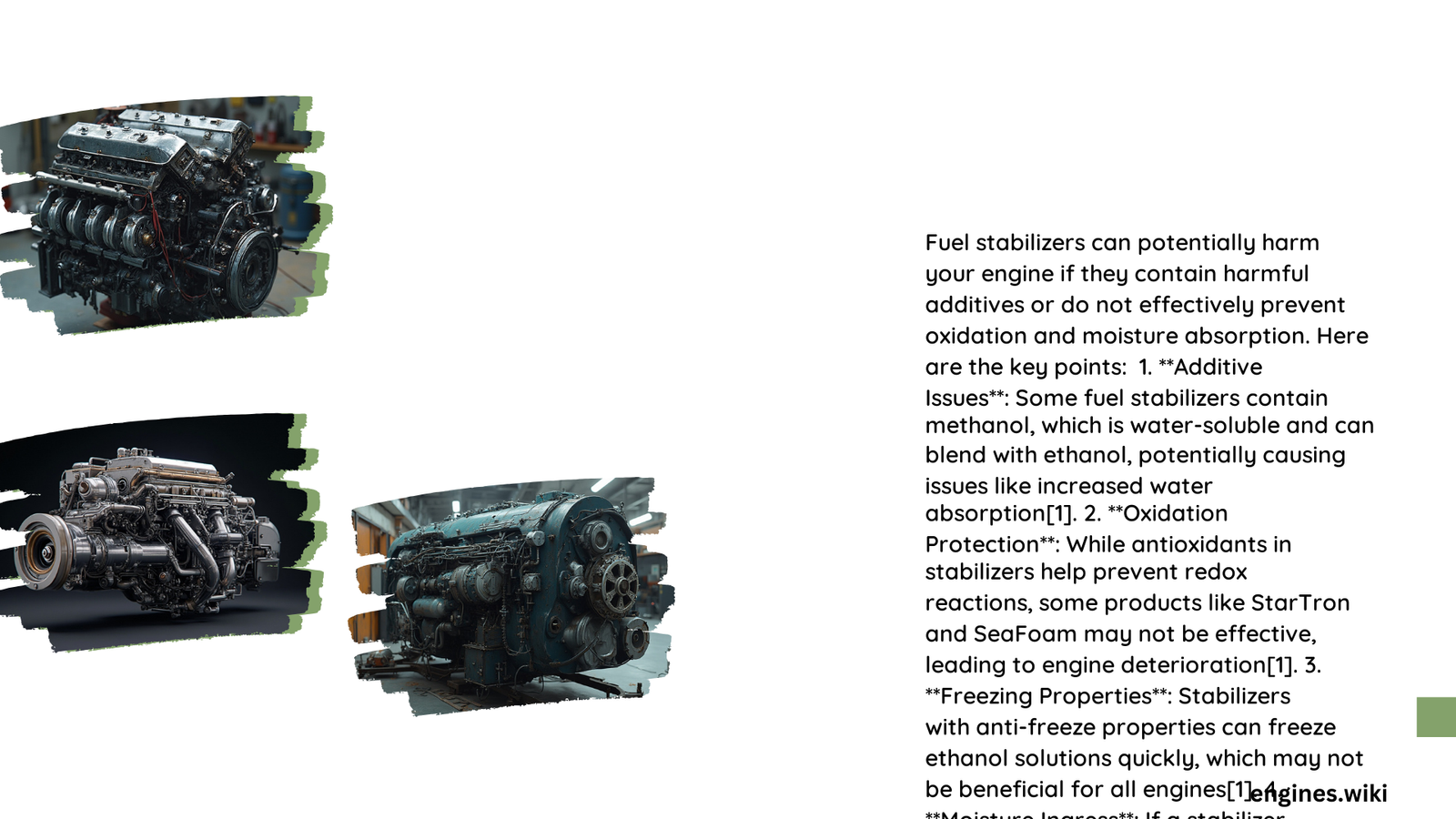Fuel stabilizers are designed to prevent fuel degradation during storage, but improper use or low-quality products can potentially harm your engine. While generally beneficial, fuel stabilizers can cause issues if used incorrectly or if they contain incompatible ingredients. This article explores the potential risks associated with fuel stabilizers, their effects on different engine types, and best practices for their use to ensure optimal engine performance and longevity.
What Are the Potential Risks of Using Fuel Stabilizers?
Fuel stabilizers, when used correctly, can help maintain fuel quality and protect your engine. However, there are potential risks associated with their use:
- Chemical Incompatibility: Using the wrong type of stabilizer for your fuel can lead to harmful chemical reactions.
- Water Accumulation: Some stabilizers may actually increase water absorption in fuel, leading to corrosion and microbial growth.
- Oxidation: Low-quality stabilizers may not effectively prevent oxidation, resulting in the formation of harmful deposits.
- Clogging: Improper use can lead to the formation of sediments that clog fuel filters and injectors.
How Can Fuel Stabilizers Affect Different Engine Types?

The impact of fuel stabilizers can vary depending on the engine type:
Gasoline Engines
- Ethanol-blended gasoline requires specific stabilizers to prevent phase separation.
- Improper stabilizers can lead to increased water absorption and corrosion.
Diesel Engines
- Diesel fuel stabilizers help prevent microbial growth and oxidation.
- Using gasoline stabilizers in diesel engines can cause severe damage.
Two-Stroke vs. Four-Stroke Engines
- Some stabilizers are compatible with both, but dosage may differ.
- Always check manufacturer recommendations for specific engine types.
What Are the Quantitative Effects of Fuel Stabilizers on Engines?
While specific data is limited, some studies have shown:
| Effect | Observation |
|---|---|
| Water Ingress | Some stabilizers increased water absorption in ethanol solutions |
| Oxidation Protection | Only certain brands effectively prevented metal deterioration |
| Combustion Efficiency | No direct data, but fuel degradation can lead to reduced performance |
How Do Manufacturer Recommendations Affect Fuel Stabilizer Use?
Manufacturers provide specific guidelines for fuel stabilizer use:
- Use stabilizers designed for your specific fuel type (gasoline or diesel).
- Follow recommended dosage instructions carefully.
- Some brands, like Biobor EB, are specifically formulated for ethanol-blended fuels.
- Howes Meaner Power Kleaner is recommended for diesel fuel to prevent microbial growth.
What Are the Long-Term Storage Issues with Fuel Stabilizers?
Long-term storage of fuel with stabilizers requires attention to:
- Storage Conditions:
- Use airtight containers
- Keep fuel tanks as full as possible to reduce condensation
-
Store in a cool, dry place
-
Usage Timelines:
- Most stabilizers can preserve fuel for up to 12 months
-
Some brands claim effectiveness for up to 18 months
-
Potential Degradation:
- Improper storage can lead to stabilizer and fuel degradation
- This can result in gum and varnish formation, clogging fuel systems
How Can You Ensure Proper Use of Fuel Stabilizers?
To maximize the benefits and minimize risks:
- Choose the right stabilizer for your fuel type and engine.
- Follow manufacturer dosage instructions precisely.
- Add stabilizer to fresh fuel before storage.
- Mix the stabilizer thoroughly with the fuel.
- Run the engine briefly after adding stabilizer to ensure distribution.
What Are the Alternatives to Fuel Stabilizers?
If concerned about potential risks, consider these alternatives:
- Regular fuel rotation (use and replace fuel every few months)
- Draining fuel systems before long-term storage
- Using fuel-free storage methods for small engines
By understanding the potential risks and following best practices, you can use fuel stabilizers effectively to protect your engine without causing harm.
